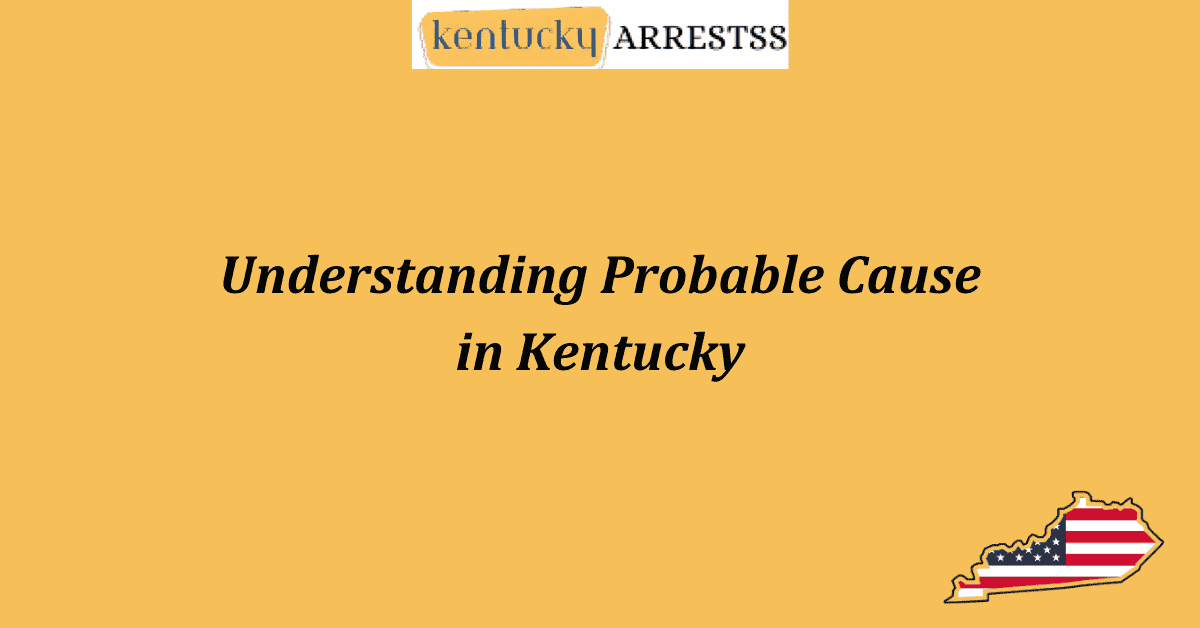Understanding Probable Cause in Kentucky
Probable cause in Kentucky is a crucial legal concept that forms the basis for many law enforcement actions. It refers to the level of suspicion required by police before they can make an arrest, conduct a search, or obtain a warrant. Understanding probable cause in Kentucky is essential for both law enforcement officials and the general public to ensure that individuals’ rights are protected within the boundaries of the law.
When it comes to probable cause in Kentucky, it is important information to note that the standard is not absolute and may vary based on the specific circumstances of each case. Police officers must be able to articulate facts and circumstances that would lead a reasonable person to believe that a crime has been committed. This level of certainty is crucial in safeguarding individuals against arbitrary arrests and unjustified searches.
What is Probable Cause in Kentucky
Probable cause in Kentucky refers to the legal standard that must be met before a law enforcement officer can make an arrest, conduct a search, or obtain a warrant. It is based on the Fourth Amendment of the United States Constitution, which protects individuals from unreasonable searches and seizures.
The Importance of Probable Cause in Law Enforcement
Probable cause plays a crucial role in ensuring that law enforcement officers do not infringe upon the rights of individuals. It serves as a safeguard against arbitrary arrests and searches, promoting accountability and transparency in the criminal justice system.
Factors Influencing Probable Cause Determination
Several factors can influence the determination of probable cause, including the specific circumstances of the case, the credibility of witnesses, and the presence of incriminating evidence. Law enforcement officers must demonstrate a reasonable belief that a crime has been committed or is about to be committed.
Legal Ramifications of Probable Cause Violations
Violations of probable cause can have serious legal consequences, such as the suppression of evidence obtained unlawfully or the dismissal of criminal charges. It is essential for law enforcement officers to adhere to the established legal standards to avoid violating individuals’ constitutional rights.
Challenges in Establishing Probable Cause
Establishing probable cause can be challenging for law enforcement officers, as they must rely on the available evidence to justify their actions. The level of suspicion required is higher than mere suspicion but lower than beyond a reasonable doubt, requiring a careful assessment of the facts.
Necessary Evidence for Probable Cause
To establish probable cause, law enforcement officers must present credible evidence that would lead a reasonable person to believe that a crime has occurred or is about to occur. This evidence can include witness statements, physical evidence, or observations made by the officers.
Case Studies Illustrating Probable Cause Application
Examining case studies can provide valuable insights into how probable cause is applied in real-life situations. By analyzing past legal decisions and court rulings, law enforcement officers can better understand the complexities of probable cause determination and its impact on criminal investigations.
Protecting Civil Liberties Through Probable Cause
Probable cause serves as a critical mechanism for protecting civil liberties and ensuring that individuals are not subjected to unwarranted searches and seizures. By upholding the legal standards of probable cause, law enforcement officers can maintain public trust and uphold the principles of justice and fairness.
Frequently Asked Questions
Find answers to common queries about Understanding Probable Cause in Kentucky below.
What is Probable Cause?
Probable cause refers to the legal standard by which law enforcement officers have the right to make an arrest, conduct a search, or obtain a warrant. It is based on the belief that a crime has been committed or is about to be committed.
How is Probable Cause Determined?
Probable cause is typically determined by evaluating the facts and circumstances known to the officer at the time of the arrest or search. This can include witness statements, physical evidence, and officer observations.
What is the Importance of Probable Cause?
Probable cause is essential as it mandates that law enforcement must have credible grounds to conduct searches or seizures, safeguarding individuals’ rights from arbitrary actions by ensuring accountability and justification for police actions.
Can Probable Cause be Challenged in Court?
Yes, individuals have the right to challenge the validity of probable cause in court. This can be done by filing a motion to suppress evidence obtained through an arrest or search based on inadequate probable cause.
Are There Exceptions to the Probable Cause Requirement?
Yes, there are certain circumstances where law enforcement officers can make an arrest or conduct a search without probable cause. These exceptions include situations where the officer has a reasonable suspicion of criminal activity or when exigent circumstances exist.
How Does Probable Cause Differ from Reasonable Suspicion?
Probable cause requires a higher standard of evidence than reasonable suspicion. While reasonable suspicion is based on a belief that criminal activity may be afoot, probable cause requires a belief that a crime has been committed or is about to be committed.






